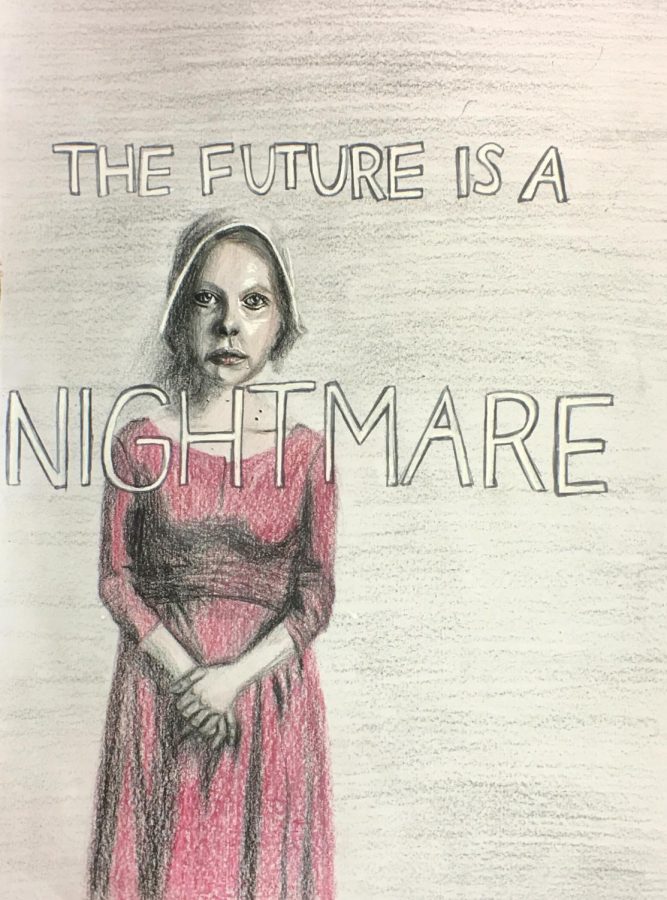The Remote’s Reality Check: How Does Cynical Television Impact Us?
January 13, 2018
Do you feel like watching something cynical? asks the Netflix screen as users log in and view the plethora of options they are given for Saturday night television. Recently, more light-hearted series centered around comedy have had dark and pessimistic television shows loom a shadow over their diminishing popularity. Currently airing are television shows such as Black Mirror, Mr. Robot, Humans, and The Handmaid’s Tale are not only products of dystopian speculation but are harrowing and satirical.
In fact, the rising prevalence of cynical television shows a parallel with society’s skyrocketing rate of technological growth and endless warfare. These shows distort reality by offering valuable social commentary on the growing trends of the present. What sets apart the prevalence of cynicism in these series from fantasy or outrageous sci-fi elements is the raw element of reality. Furthermore, television is slowly moving away from fiction and is beginning to reflect our everyday experiences right in front of our own screens.
Black Mirror, a British anthology series by director Charlie Brooker, took Netflix viewers up by storm with each episode of the show portraying a different satirical theme in an eerie light. Black Mirror primarily focuses on society’s fixation towards technology and the dire consequences of technological advancements, and the episode’s conclusions always leave viewers with a mind twist and an ominous but relevant message.
In Season 2, episode “White Bear” presents one of the most harrowing and shocking twists known to the series. In “White Bear”, a young woman named Victoria Skillane wakes up to find herself tied to a chair, left alone in an unknown house with pills lying around her. As she tries to piece together the life that she supposedly forgotten, masked individuals constantly hunt her down with weapons. Beyond Victoria’s house, strangely robotic people hide behind their mobile phones and record her every move as she runs for her life. The premise deceives people into thinking the episode possesses a thriller narrative. However, “White Bear” presents its true intention only towards the last five minutes of the episode, driving the viewer to the edge of their seat as they watch with bated breath. In typical Black Mirror fashion, the ending poses a question to society and always leaves the viewer questioning the world that they live in. Without giving away any spoilers, “White Bear” is an episode that allows one to question the morality behind their actions, as well as the consequences of deception.
Another anthology from the Black Mirror Universe delves into the story of Kenny in “Shut Up And Dance”. The audience is introduced to Kenny as a sweet and hardworking boy working in a restaurant kitchen. After his sister freezes his computer trying to watch illegal movies, Kenny downloads a free malware program called Shrive, which, unbeknownst to him, activates his laptop camera and begins filming him. Kenny’s entire world crumbles into pieces within seconds as he must follow the orders the anonymous account messages him through his phone. The words “REPLY WITH YOUR PHONE NUMBER OR WE POST THE VIDEO TO EVERYONE IN YOUR CONTACTS” is what keeps Kenny obligated to fulfill various bizarre tasks. At the end of the episode, the viewers are left with their sense of reliance towards the internet abolished, but also confused as to which character they should sympathize with.
“White Bear” and “Shut Up and Dance” are just two episodes in the entirety of the Black Mirror series. Just like the name of the series, a mirror allows one to look at themselves and reflect on their own actions. On a larger scale, Black Mirror serves as a warning for the future generation, but the show’s scapegoat for potential ruin is not the screens and the gadgets that surround everyday life. As Brooker once said in an interview on Black Mirror: “‘It’s not a technological problem we have, it’s a human one”.
On the other hand, American thriller television series Mr. Robot focuses its social commentary not on the dangers of technology, but the dominance of massive conglomerates and the vices of capitalism. Mr. Robot deliberately takes a jab at the extremely wealthy and corrupt, telling the story of Elliot Alderson, a cybersecurity engineer who is recruited by an anarchist known as “Mr. Robot”. Eventually, Elliot enters the world of hackers and rebels called “Fsociety”, whose goal is to encrypt the financial data of the largest business in the world, E Corp. Being an engineer by day and vigilante hacker by night sounds pretty impressive, right? To Elliot’s misfortune, his efforts to become an insurgent takes a serious toll on his mental and physical health. Mr. Robot expresses the futility of man against the towering authority of conglomerates. One message rings loud and clear: the most dangerous aspect of society is the omnipresent force of corporal power.
As the popularity of cynical television series continues to rise, Ridge High School students are not the only teenagers that are forced to make parallels between a world where technology overtakes a character’s life and a world of technological advances that they live in. Television series with a darker theme are meant to provoke the audience. When it comes down to every episode that presents a striking similarity to the familiarity of reality, cynical shows are meant to criticize, urging viewers to realize that the world projected on the screen is more than a dream.

